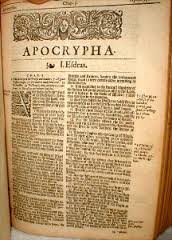
记忆方法
将“apocryphal”拆分为“apo”和“crypt”。想象一个神秘的地下室(crypt)中藏有“apo”即被隐藏或非正式的文件,这些文件被认为是传说或虚构的,从而帮助记忆“apocryphal”意为传说性的或伪善的。
以上内容由AI生成, 仅供参考和借鉴
中文词源
apocryphal 伪经
前缀apo-, 从,从...离开。词根cryph, 隐藏,同crypt, 地窖。指从隐蔽处来,不可信。
英语词源
- apocryphal
-
apocryphal: [16] Apocryphal is a ‘secondgeneration’ adjective; the original adjective form in English was apocrypha (‘The writing is apocrypha when the author thereof is unknown’, John de Trevisa 1387). This came, via ecclesiastical Latin, from Greek apókruphos ‘hidden’, a derivative of the compound verb apokrúptein ‘hide away’, which was formed from the prefix apo- ‘away, off’ and the verb krúptein ‘hide’ (source of English crypt and cryptic).
It was applied as a noun to writings in general that were of unknown authorship, and in the 16th century came to be used specifically as the collective term for the uncanonical books of the Old Testament. It was perhaps confusion between the adjectival and nominal roles of apocrypha that led to the formation of the new adjective apocryphal towards the end of the 16th century.
=> crypt, cryptic - apocryphal (adj.)
- 1580s, "of doubtful authenticity," from Apocrypha + -al (1). Middle English had apocrive (late 14c.) in same sense.
权威例句
- 1. Most of the stories about him are apocryphal.
- 关于他的传闻多属虚构。
- 2. Most of the story about his private life was probably apocryphal.
- 有关他私生活的事可能大部分都是虚构的.
- 3. The apocryphal story of Columbus and the egg is very interesting.
- 哥伦布竖蛋这个真伪不明的故事十分有趣.
- 4. There is a story, probably apocryphal, about a British motorcyclist on holiday in America.
- 故事讲述一位英国摩托车手在美国度假,但未必真实。
- 5. This may well be an apocryphal story.
- 这很可能是个杜撰的故事。
